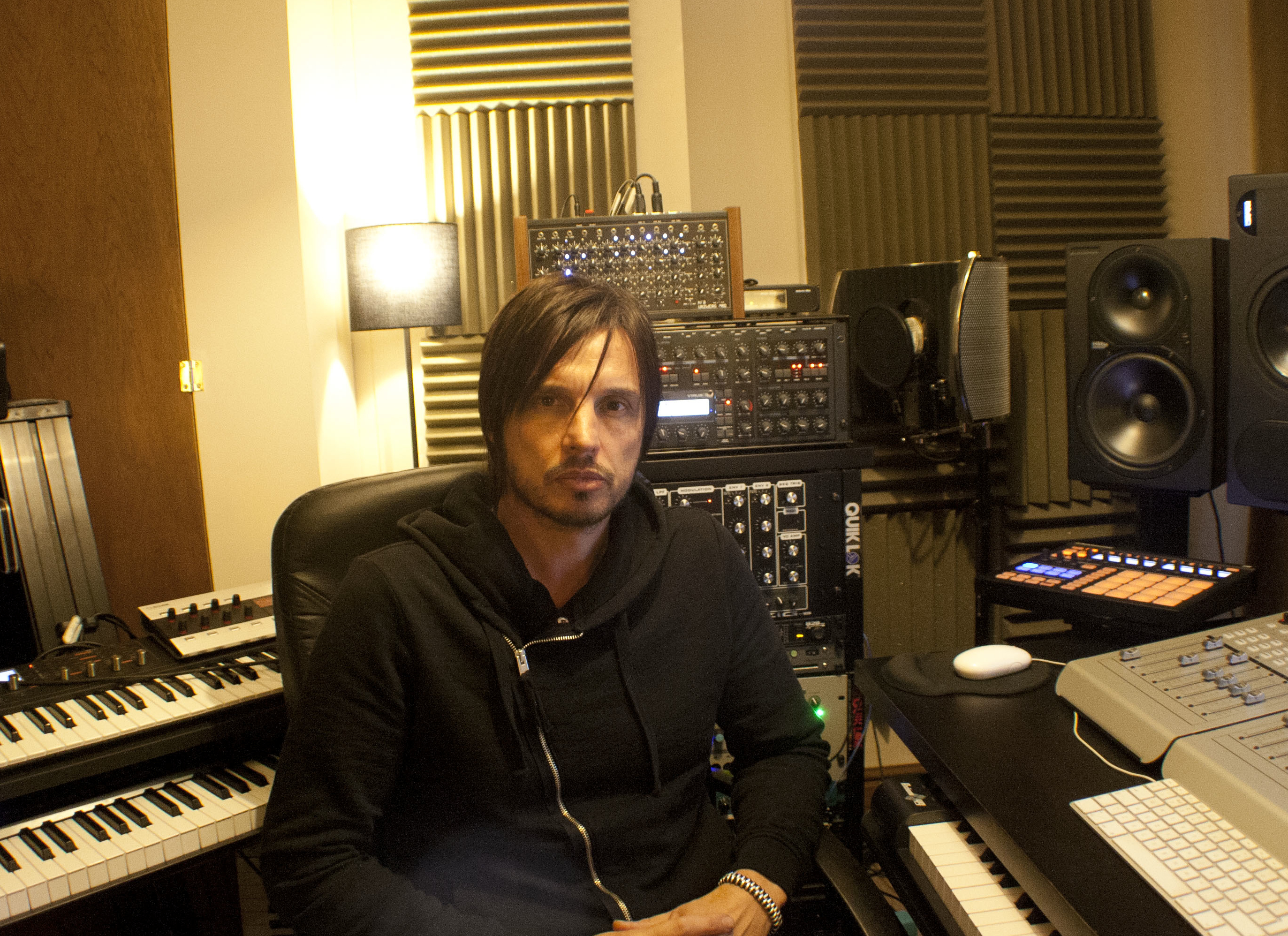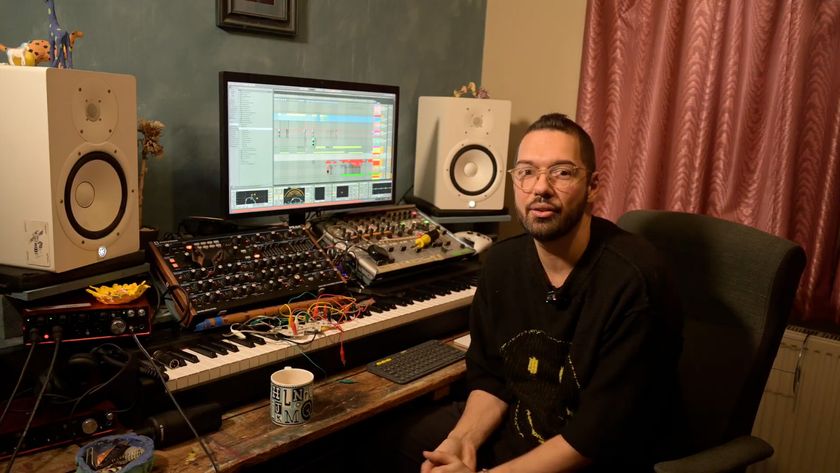Electronic music production with DJ/producer Ade Fenton
Including key tips on how to get the most of your studio

PRODUCTION EXPO 2014: Resident DJ at Birmingham techno event Atomic Jam, Ade Fenton released his debut album, Artificial Perfect, in 2007 but is more recently known for his production work with Gary Numan - the pair are due to release their soundtrack to the award-winning animated movie From Inside this November.
Currently producing electro-pop duo April Towers for a release later this year, we recently tapped into Ade's in-depth knowledge of electronic music production, including some key pointers on how to make the most out of your studio.
Setting up a studio affordably
" I guess it depends on what kind of music you're making. I've used lots of DAWs including Logic, Pro Tools and Ableton and found them all brilliant, but for production I've found Logic the best because it's the most chronological. In terms of hardware, using a Mac Pro rather than a PC would definitely help. I have a mental block using a laptop - it doesn't feel like I'm making music properly - but they're so well specced-up these days that you can pretty much run whatever you like on them. And get yourself a good MIDI controller keyboard as well. I use the M-Audio Axiom Pro Series."
Running hardware on a laptop
"Certainly with a laptop you're always going to experience some form of latency regardless of what anyone says. I've still got latency in my studio and it drives me crazy, but I've got 20 pieces of equipment linked up to my computer. If you've got a 16-channel MIDI box and everything's being used, it's going to bottleneck somewhere. If you try to do one thing at a time you should be ok. "
"I'm quite happy spending hours making stupid noises and feeding them through the most ridiculous routing you can think of"
Finding the right software
"If you're just starting up then chances are you're probably not going to be able to afford to buy yourself a room full of analogue synths. In terms of software, I'm a huge fan of Spectrasonics Omnisphere. Naked Instruments makes some great stuff at a really good price too, and Camel Audio Alchemy is a magnificent sample-based synthesiser. But if you're just starting, then the instruments included within Logic are all of a reasonable standard."
Sound creation
"I like to process sounds as much as possible and really enjoy the process of experimentation in the studio. For the Gary Numan album Splinter, Omnisphere was used a lot, Spectrasonics Trilian and the Access Virus TI. I'm also using this semi-modular synth from Analogue Solutions called the Vostok, which has a pin matrix sequencer and is just incredible. I tend to process sounds through guitar pedals and I'm quite happy spending hours making stupid noises and feeding them through the most ridiculous routing you can think of just to see what happens. "
Understanding your tools
"Obviously you have to know what's right and what's wrong. If something's ducking ridiculously or clipping, there's clearly something wrong with the mix, but I think it's all down to experimentation... And reading the manual. I went through a phase where I needed every single plug-in on the planet, then I really got mathematical about it and tried to understand what each plug-in or hardware processor did. Rather than having 100,000 plug-ins, buy 100 and learn what they do."
Get the MusicRadar Newsletter
Want all the hottest music and gear news, reviews, deals, features and more, direct to your inbox? Sign up here.
"I must admit that when you stick a CD on, if it's loud it immediately gets your attention but it's sometimes lacking in dynamics"
Monitors
" I've been quite lucky recently because I've started working with PMC and have their flagship 8-inch bass cone mid-field monitoring system, which is incredible. I worked for a long time on Mackies, but when I spent time with the PMC 2.2.6's I just thought, 'What the hell am I doing? I'm missing so much that's going on'. A good pair of speakers is incredibly important, but just as important is making sure that your room is acoustically treated to identify problems. You can spend £10,000 on monitors but they're still going to sound shit in a shit room."
Referencing other mixes
"With Splinter we referenced what we considered to be the best mixed and produced electronic music around. For example, 'Does that guitar on the left-hand side sound as good as the Alan Moulder-produced sound on the left-hand side? If not, why not?' Constantly referencing your music against others is a massive part of it because mixing is pretty much what it's about. Not everyone can have a £3m studio and mixing out of the box is not going to have the analogue warmth of something mixed on an SSL desk, but you can get damn close and that will show in the final product."
"I'll probably get a track up to 90 per cent of the final product, then my mix engineer can add the next 5 per cent and the mastering is the final 5 per cent"
Loudness vs dynamics
"The loudness versus dynamics argument is very interesting. I must admit that when you stick a CD on, if it's loud it immediately gets your attention but it's sometimes lacking in dynamics. Nine Inch Nails released two versions of their last album: one that was smashed to fuck and the other where the dynamics were allowed to come through. As a producer I prefer the dynamic version. As a consumer I'd have to say the version in the car is the smashed one."
Mixing and mastering
"I used to mix as I was going along but it just wasn't working. I ended up thinking, 'Why am I removing all these EQs and frequencies when I can do all this at the end?' Now I might sample drums to a drum buss and add decapitator to get them sounding amazing, but the actual process of fine tuning always comes at the end. I'll probably get a track up to 90 per cent of what the final product is, then my mix engineer can add the next 5 per cent and the mastering is the final 5 per cent.
"There are some great mastering engineers out there who are really cheap, but you need to be aware of giving the engineer something he can work with. The amount of tracks they get that are smashed to hell with no headroom at all and people say, 'Make that sound better', well, how can they do that? The mix has to be right before you give it to a mastering engineer."
Interview: Danny Turner

“My love letter to a vanished era that shaped not just my career but my identity”: Mark Ronson’s new memoir lifts the lid on his DJing career in '90s New York

“I'm always starting up sessions and not finishing them, but I don't see that as unproductive”: Virtuosic UK producer Djrum talks creativity and making Frekm Pt.2








